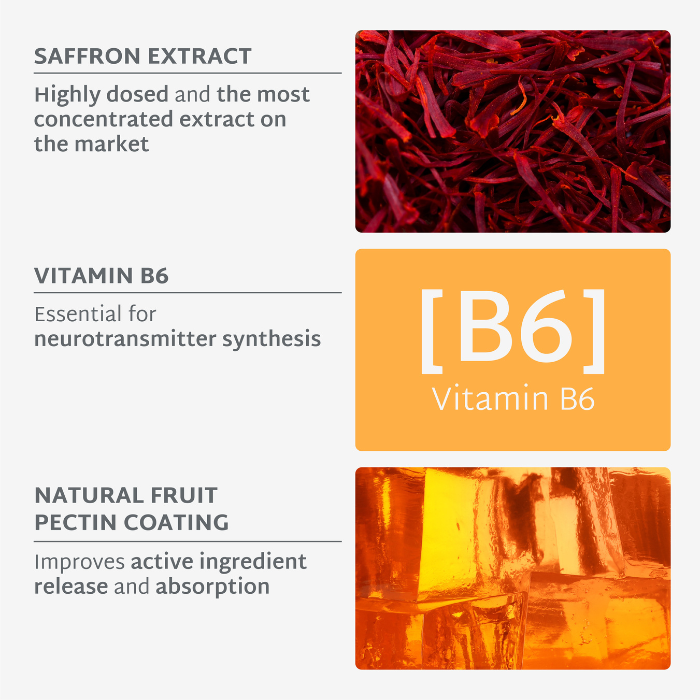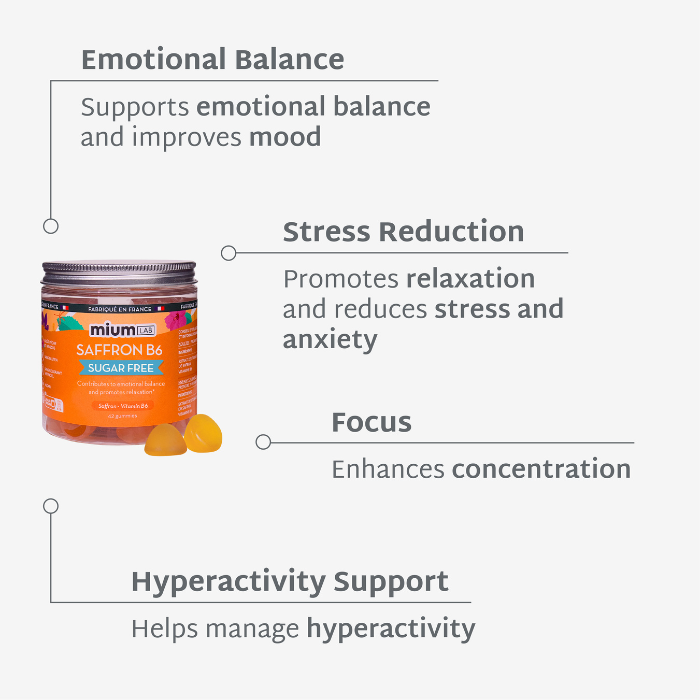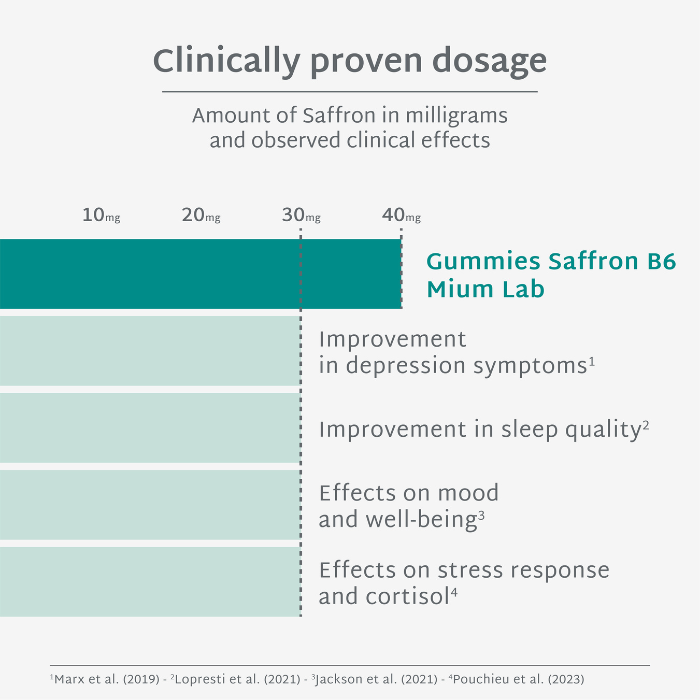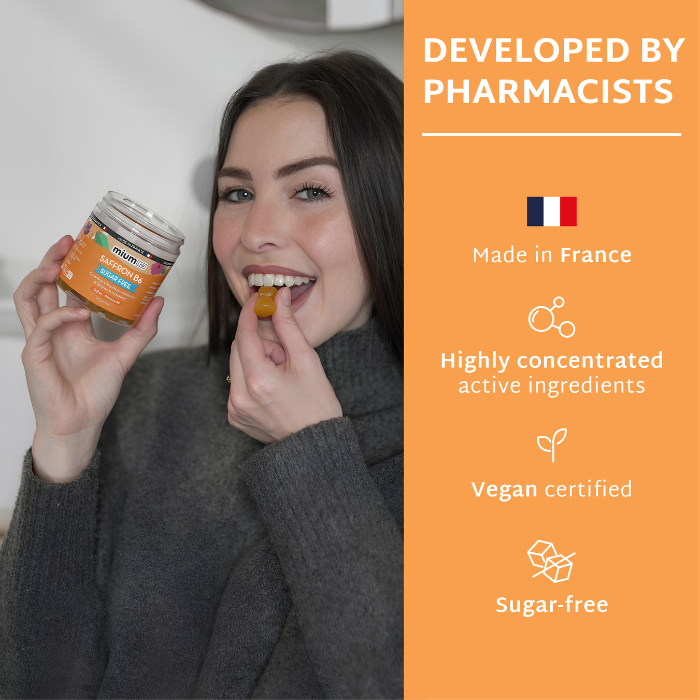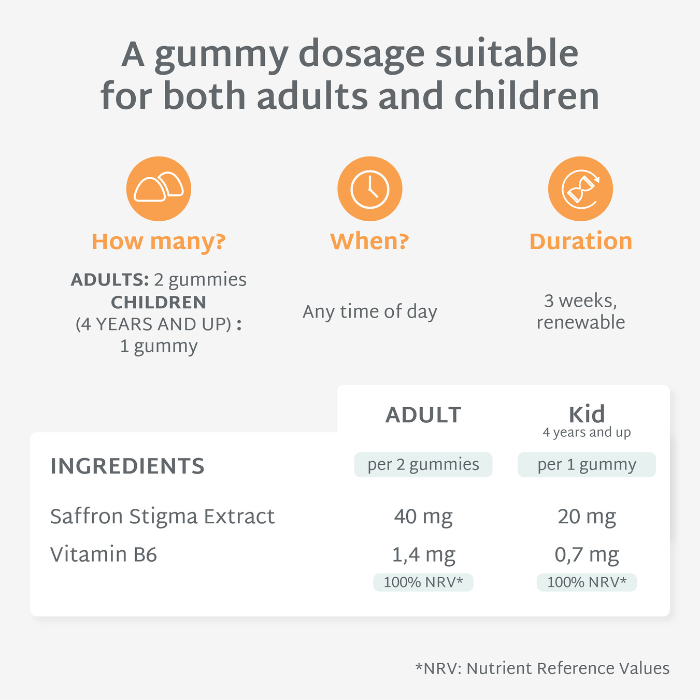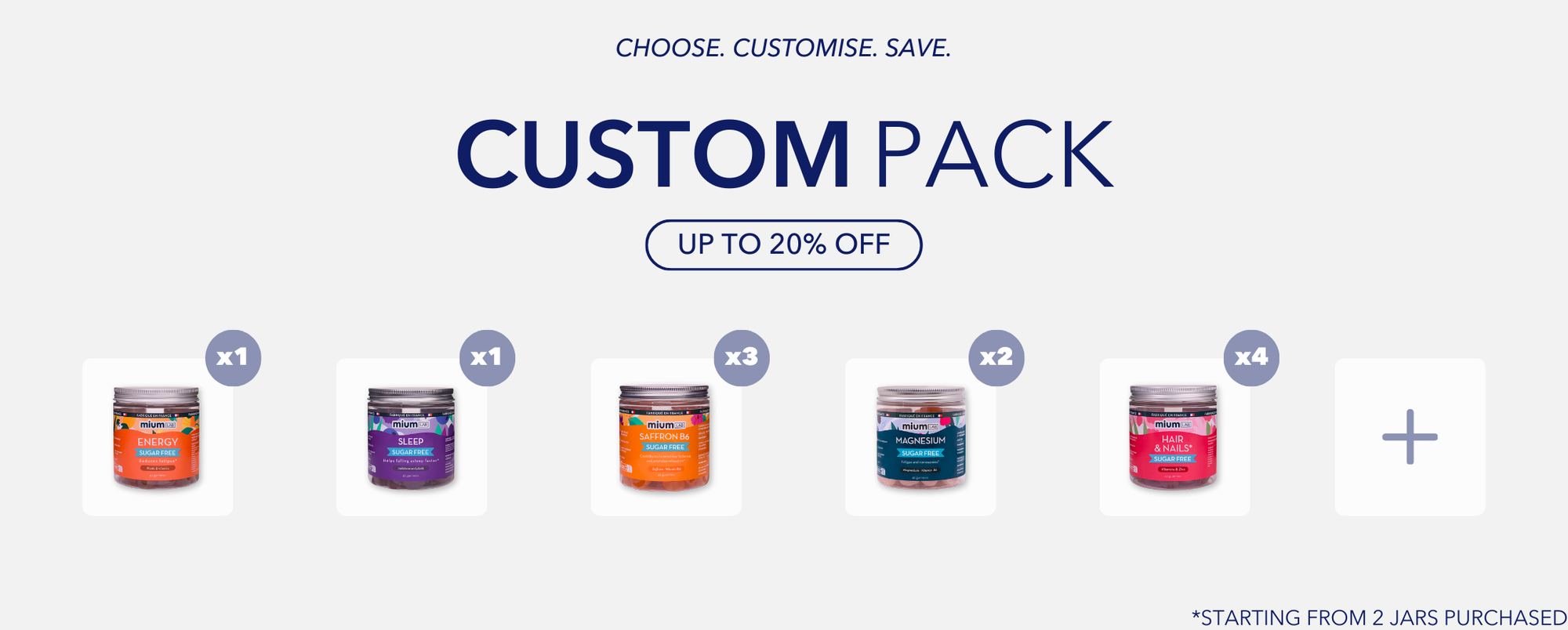
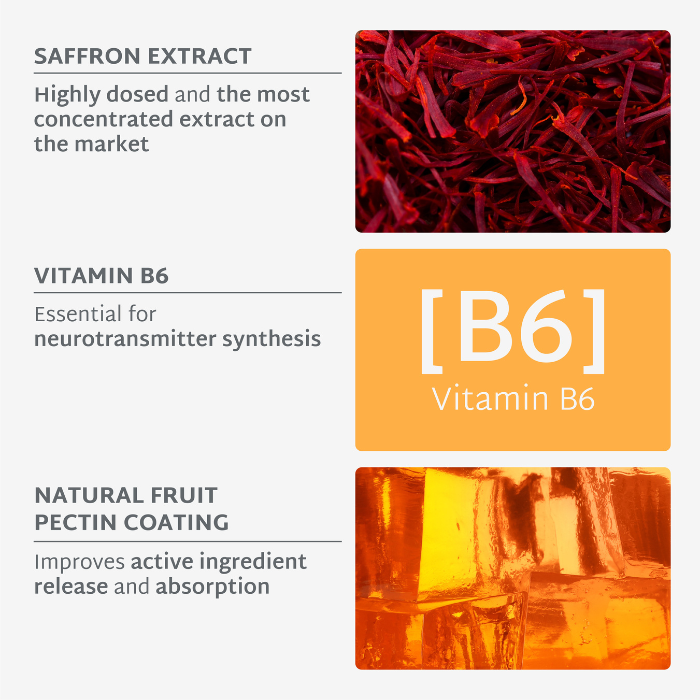
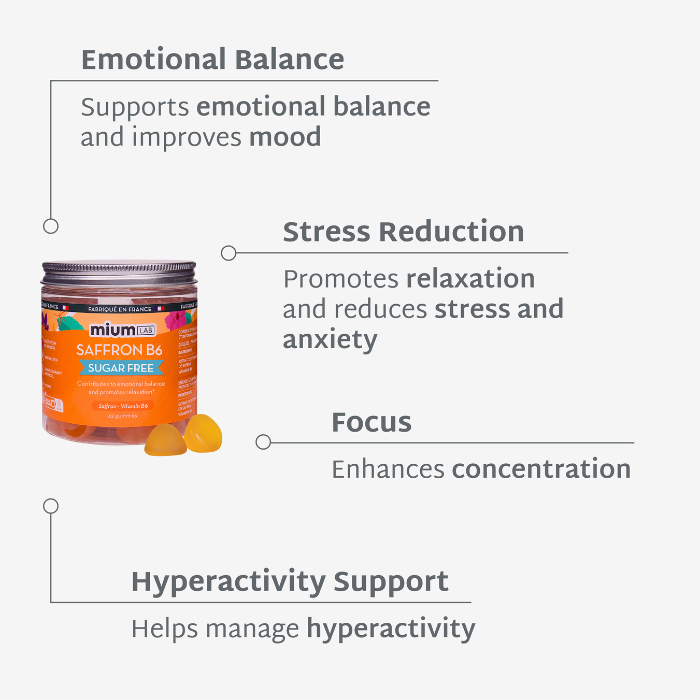
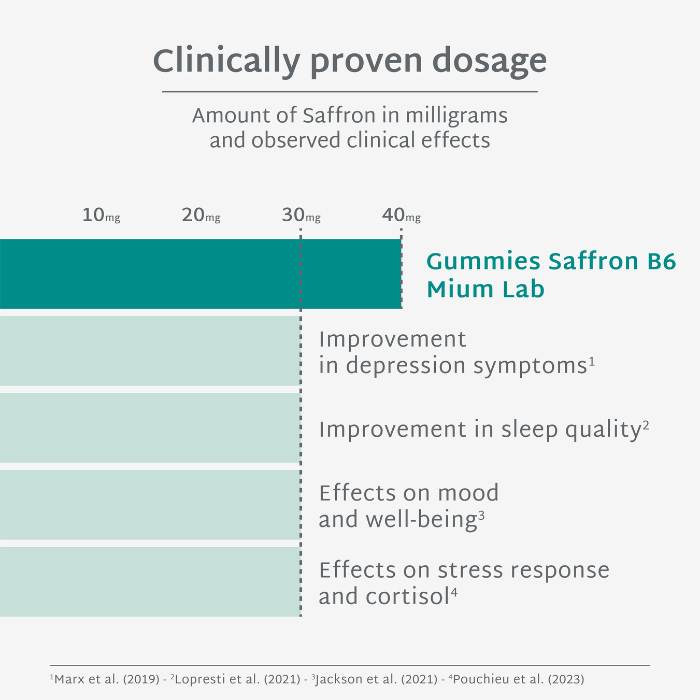
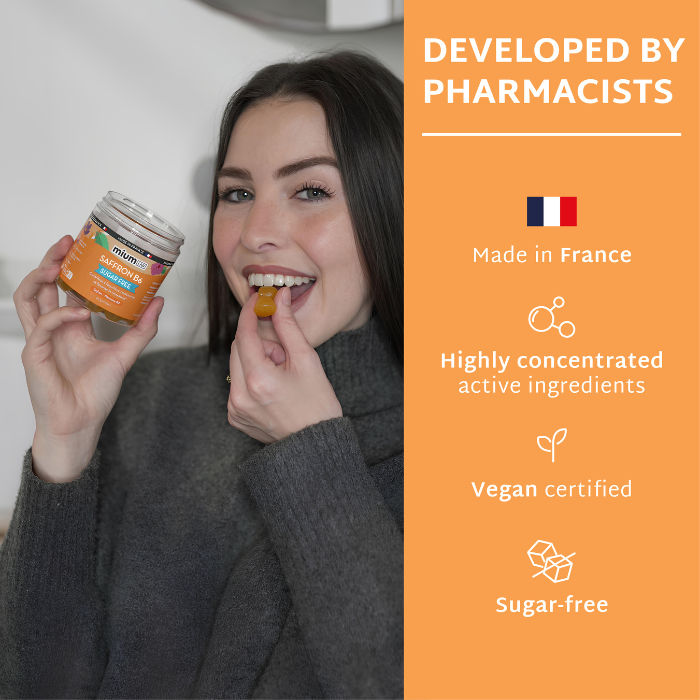
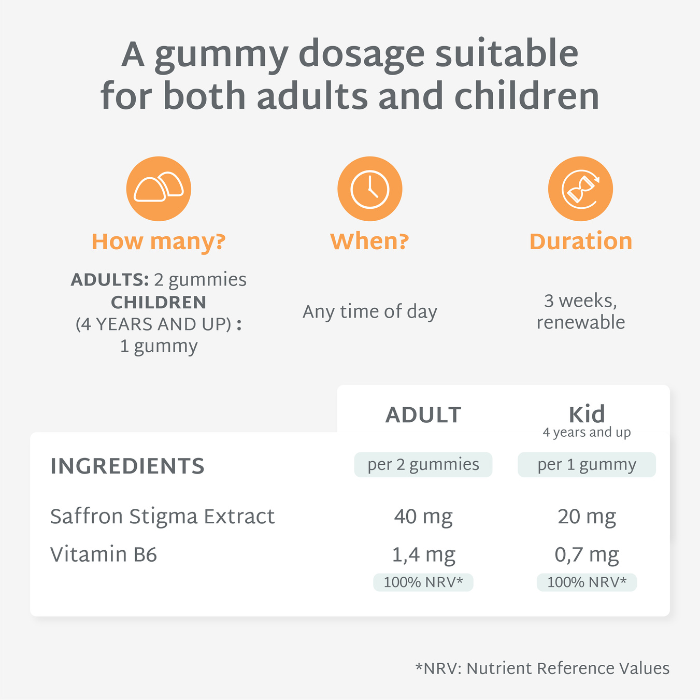
How science powers our gummies
CLINICAL STUDIES
Effect on mood and well-being
A double-blind, placebo-controlled study found that supplementing with 30 mg of saffron extract for 8 weeks improved emotional well-being in healthy adults experiencing subclinical feelings of low mood, anxiety, and/or stress. The same study observed that saffron extract reduced depression scores and enhanced social relationships by the end of the trial, suggesting an improvement in subclinical depressive symptoms in healthy individuals (Jackson et al., 2021).
Antidepressant and anxiolytic properties
Research suggests that saffron has effects similar to current antidepressant medications but with fewer reported side effects. These benefits are believed to come from saffron’s active compounds, primarily crocin and safranal (Shafiee et al., 2018).Reduction of depression and anxiety symptoms
A meta-analysis confirmed that saffron supplementation leads to a significant reduction in scores on the Beck Depression Inventory (BDI), the Beck Anxiety Inventory (BAI), and the Pittsburgh Sleep Quality Index (PSQI), without affecting C-reactive protein (CRP) levels. This suggests a decrease in depression and anxiety symptoms without impacting systemic inflammation (Ghaderi et al., 2020).These clinical studies indicate that saffron could be an effective intervention for managing symptoms of depression and anxiety, offering a natural alternative to conventional treatments. Additionally, vitamin B6, essential for the optimal functioning of the nervous and immune systems, helps reduce fatigue and supports mood by contributing to serotonin synthesis. Together, saffron and vitamin B6 form a powerful duo to support mental health and overall well-being.
ACTIVE INGREDIENTS
The most concentrated saffron on the market
Our saffron, made exclusively from Sargol (the richest red tip in active compounds and aroma), is the most concentrated extract of crocins and safranal available. Classified as 100% red and ranked in Category 1 according to international standards, our saffron guarantees superior purity and potency, reflecting our commitment to exceptional quality and total customer satisfaction.Geographical origin and history
Grown in the fertile lands of northeastern Iran, our saffron benefits from a centuries-old agricultural tradition and is harvested using traditional methods that ensure its premium quality. Hand-harvested at sunrise in the Khorasan province, this careful process is essential to maintaining the spice’s superior quality and high concentration of active compounds.A rigorous 10-step analysis process
Our commitment to quality is reflected in a strict 10-step analysis protocol, from traditional hand-picking to in-depth laboratory testing. This process guarantees the purity, potency, and integrity of our saffron, ensuring consistent and verifiable quality.
Impact on well-being and health
With its rich bioactive profile and our meticulous selection process, our saffron plays a significant role in mental health and overall well-being, demonstrating the latest scientific advances in the field of phytotherapy.
COMPOSITION
42 gummies per jar
| Adults | Children (from age 4 and over) | |
|---|---|---|
| Active ingredient | For 2 gummies | For 1 gummy |
| Saffron stigma extract | 40 mg | 20 mg |
| Vitamin B6 | 1.4 mg VNR: 100% |
0.7 mg VNR: 50% |
Bulking agent: maltitol - Gelling agent: pectin - Acidifying agent: citric acid - Saffron stigma extract (Crocus sativus) - Acidifying agent: sodium citrates - Natural flavourings - Coating agent: carnauba wax - Concentrate (carrot and blackcurrant) - pyridoxine hydrochloride (vitamin B6)
Dosage
From the age of 4.
2 gummies a day, at any time of day for 3 weeks. You can then take a break for a week to take advantage of the therapeutic window, then start a course of treatment again if you feel the need.
The gummies should be kept in a dry place and protected from light.
Contraindications
Not recommended for children under 4, pregnant and breast-feeding women, or people taking antidepressants.
SCIENCE
Neurobiological foundations of mood
Mood regulation is a neurobiological process involving brain structures such as the amygdala (emotion processing) and the prefrontal cortex (regulation of emotional responses and decision-making). Neurotransmitters like serotonin (often referred to as the "happiness hormone") and dopamine, which is linked to the brain’s reward system, play a key role in mood modulation. A disruption in these systems, often triggered by stress or psychological disorders, can lead to a persistent sense of discomfort, sadness, and apathy.
Dysphoria and neurotransmitter imbalance
Dysphoria, characterised by a consistently disturbed mood, is closely linked to imbalances in these neurotransmitters. Serotonin directly influences well-being and satisfaction, while dopamine affects motivation and the perception of pleasure. Prolonged irregularities in neurotransmitter signalling can reduce emotional resilience, impair stress management, and lower engagement in daily activities.
The influence of circadian rhythms on mood
Circadian rhythms, or the body’s internal clock, regulate sleep cycles, wakefulness, mood, and behaviour, playing a crucial role in mental health. These rhythms are controlled by the suprachiasmatic nucleus in the hypothalamus, which synchronises our internal clock with the day-night cycle based on ambient light. Disruptions such as shift work, jet lag, or stress can desynchronise these rhythms.
Vitamin B6 and saffron in mood regulation
Vitamin B6, essential for the synthesis of serotonin and dopamine, is key to maintaining mood balance, and a deficiency can disrupt this equilibrium. Saffron has also been shown to have positive effects on the serotonergic system and may help alleviate symptoms of dysphoria, enhancing mood and contributing to overall well-being.
References
Wever, R. A. (1979). The Circadian System of Man: Results of Experiments under Temporal Isolation. Springer.
Panda, S. (2018). The Circadian Code. Penguin Random House.
Bernard, S., Gonze, D., Cajavec, B., Herzel, H., & Kramer, A. (2007). Synchronization-induced rhythmicity of circadian oscillators in the suprachiasmatic nucleus. PLoS Computational Biology, 3(4), e68.
Borbély, A. A., Daan, S., Wirz-Justice, A., & Deboer, T. (2016). The two-process model of sleep regulation: a reappraisal. Journal of Sleep Research, 25(2), 131-143.
INSERM. (2017). Sleep: Shedding Light on Our Nocturnal Activity.
BENEFITS

Saffron extract has been clinically validated for its ability to alleviate symptoms of depression. In a study by Marx et al. (2019), participants receiving saffron experienced a significant reduction in depressive symptoms, suggesting a positive effect on mental health and mood regulation.
Enhances sleep quality
Saffron supplementation has been shown to improve sleep quality in adults, as demonstrated in a study by Lopresti et al. (2021). This effect may be linked to saffron’s influence on neurotransmitters associated with sleep cycles and relaxation.
Improves well-being and mood
Saffron appears to play a role in enhancing overall well-being, according to a study by Jackson et al. (2021). Participants who consumed saffron reported an increase in well-being and a reduction in stress symptoms, contributing to a better overall quality of life.
Regulates stress response and cortisol levels
Research by Pouchieu et al. (2023) suggests that saffron may help regulate both the biological and psychological response to stress. Findings indicate that saffron may influence cortisol levels, the primary stress hormone, which could have positive implications for managing chronic stress.
Effect on mood and well-being
A double-blind, placebo-controlled study found that supplementing with 30 mg of saffron extract for 8 weeks improved emotional well-being in healthy adults experiencing subclinical feelings of low mood, anxiety, and/or stress. The same study observed that saffron extract reduced depression scores and enhanced social relationships by the end of the trial, suggesting an improvement in subclinical depressive symptoms in healthy individuals (Jackson et al., 2021).
Antidepressant and anxiolytic properties
Research suggests that saffron has effects similar to current antidepressant medications but with fewer reported side effects. These benefits are believed to come from saffron’s active compounds, primarily crocin and safranal (Shafiee et al., 2018).Reduction of depression and anxiety symptoms
A meta-analysis confirmed that saffron supplementation leads to a significant reduction in scores on the Beck Depression Inventory (BDI), the Beck Anxiety Inventory (BAI), and the Pittsburgh Sleep Quality Index (PSQI), without affecting C-reactive protein (CRP) levels. This suggests a decrease in depression and anxiety symptoms without impacting systemic inflammation (Ghaderi et al., 2020).These clinical studies indicate that saffron could be an effective intervention for managing symptoms of depression and anxiety, offering a natural alternative to conventional treatments. Additionally, vitamin B6, essential for the optimal functioning of the nervous and immune systems, helps reduce fatigue and supports mood by contributing to serotonin synthesis. Together, saffron and vitamin B6 form a powerful duo to support mental health and overall well-being.
The most concentrated saffron on the market
Our saffron, made exclusively from Sargol (the richest red tip in active compounds and aroma), is the most concentrated extract of crocins and safranal available. Classified as 100% red and ranked in Category 1 according to international standards, our saffron guarantees superior purity and potency, reflecting our commitment to exceptional quality and total customer satisfaction.Geographical origin and history
Grown in the fertile lands of northeastern Iran, our saffron benefits from a centuries-old agricultural tradition and is harvested using traditional methods that ensure its premium quality. Hand-harvested at sunrise in the Khorasan province, this careful process is essential to maintaining the spice’s superior quality and high concentration of active compounds.A rigorous 10-step analysis process
Our commitment to quality is reflected in a strict 10-step analysis protocol, from traditional hand-picking to in-depth laboratory testing. This process guarantees the purity, potency, and integrity of our saffron, ensuring consistent and verifiable quality.
Impact on well-being and health
With its rich bioactive profile and our meticulous selection process, our saffron plays a significant role in mental health and overall well-being, demonstrating the latest scientific advances in the field of phytotherapy.42 gummies per jar
| Adults | Children (from age 4 and over) | |
|---|---|---|
| Active ingredient | For 2 gummies | For 1 gummy |
| Saffron stigma extract | 40 mg | 20 mg |
| Vitamin B6 | 1.4 mg VNR: 100% |
0.7 mg VNR: 50% |
Bulking agent: maltitol - Gelling agent: pectin - Acidifying agent: citric acid - Saffron stigma extract (Crocus sativus) - Acidifying agent: sodium citrates - Natural flavourings - Coating agent: carnauba wax - Concentrate (carrot and blackcurrant) - pyridoxine hydrochloride (vitamin B6)
Dosage
From the age of 4.
2 gummies a day, at any time of day for 3 weeks. You can then take a break for a week to take advantage of the therapeutic window, then start a course of treatment again if you feel the need.
The gummies should be kept in a dry place and protected from light.
Contraindications
Not recommended for children under 4, pregnant and breast-feeding women, or people taking antidepressants.
Neurobiological foundations of mood
Mood regulation is a neurobiological process involving brain structures such as the amygdala (emotion processing) and the prefrontal cortex (regulation of emotional responses and decision-making). Neurotransmitters like serotonin (often referred to as the "happiness hormone") and dopamine, which is linked to the brain’s reward system, play a key role in mood modulation. A disruption in these systems, often triggered by stress or psychological disorders, can lead to a persistent sense of discomfort, sadness, and apathy.
Dysphoria and neurotransmitter imbalance
Dysphoria, characterised by a consistently disturbed mood, is closely linked to imbalances in these neurotransmitters. Serotonin directly influences well-being and satisfaction, while dopamine affects motivation and the perception of pleasure. Prolonged irregularities in neurotransmitter signalling can reduce emotional resilience, impair stress management, and lower engagement in daily activities.
The influence of circadian rhythms on mood
Circadian rhythms, or the body’s internal clock, regulate sleep cycles, wakefulness, mood, and behaviour, playing a crucial role in mental health. These rhythms are controlled by the suprachiasmatic nucleus in the hypothalamus, which synchronises our internal clock with the day-night cycle based on ambient light. Disruptions such as shift work, jet lag, or stress can desynchronise these rhythms.
Vitamin B6 and saffron in mood regulation
Vitamin B6, essential for the synthesis of serotonin and dopamine, is key to maintaining mood balance, and a deficiency can disrupt this equilibrium. Saffron has also been shown to have positive effects on the serotonergic system and may help alleviate symptoms of dysphoria, enhancing mood and contributing to overall well-being.
References
Wever, R. A. (1979). The Circadian System of Man: Results of Experiments under Temporal Isolation. Springer.
Panda, S. (2018). The Circadian Code. Penguin Random House.
Bernard, S., Gonze, D., Cajavec, B., Herzel, H., & Kramer, A. (2007). Synchronization-induced rhythmicity of circadian oscillators in the suprachiasmatic nucleus. PLoS Computational Biology, 3(4), e68.
Borbély, A. A., Daan, S., Wirz-Justice, A., & Deboer, T. (2016). The two-process model of sleep regulation: a reappraisal. Journal of Sleep Research, 25(2), 131-143.
INSERM. (2017). Sleep: Shedding Light on Our Nocturnal Activity.

Saffron extract has been clinically validated for its ability to alleviate symptoms of depression. In a study by Marx et al. (2019), participants receiving saffron experienced a significant reduction in depressive symptoms, suggesting a positive effect on mental health and mood regulation.
Enhances sleep quality
Saffron supplementation has been shown to improve sleep quality in adults, as demonstrated in a study by Lopresti et al. (2021). This effect may be linked to saffron’s influence on neurotransmitters associated with sleep cycles and relaxation.
Improves well-being and mood
Saffron appears to play a role in enhancing overall well-being, according to a study by Jackson et al. (2021). Participants who consumed saffron reported an increase in well-being and a reduction in stress symptoms, contributing to a better overall quality of life.
Regulates stress response and cortisol levels
Research by Pouchieu et al. (2023) suggests that saffron may help regulate both the biological and psychological response to stress. Findings indicate that saffron may influence cortisol levels, the primary stress hormone, which could have positive implications for managing chronic stress.
ALL ABOUT OUR SUGAR-FREE SAFFRON B6 GUMMIES
What are the ingredients in Saffron B6 gummies?
What vitamins are contained in Saffron B6 gummies?
At what age can gummies Saffron B6 be taken?
What are the benefits of a saffron gummies treatment?
Why take a course of Mium Lab Saffron B6 gummies?
Pregnancy, breastfeeding or medical treatment: what are the contraindications?
Why choose Mium Lab's Saffron gummies?



